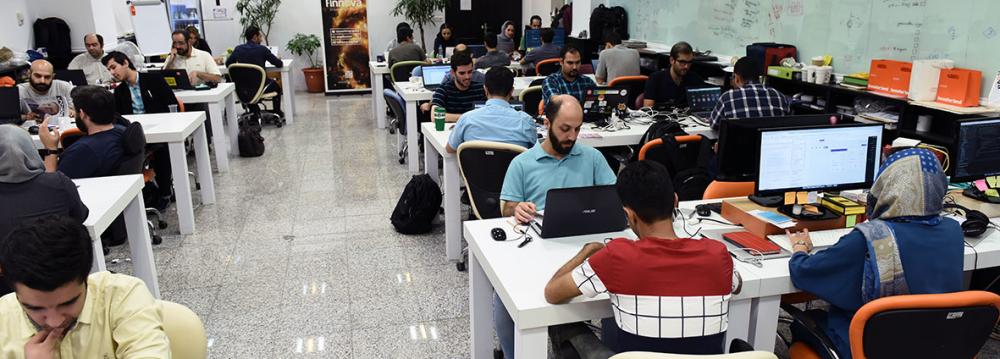The growth of Iranian technology ecosystem is expected to speed up, as the number of startup accelerators is on the rise.
Mehdi Azimian, an official with the Vice Presidential Office for Science and Technology, said that in the last Iranian year (ended March 19, 2020), accelerators have had a significant qualitative and quantitative growth, the office's website Isti.ir reported.
“The number of certified centers has reached 55 and will continue to increase. Besides, they offer stronger support to fledgling tech teams and startups,” he said.
Accelerators provide startups with technical and legal assistance besides monetary facilities, and help them expand their businesses and enter new markets.
Based on their rules, accelerators carry out quarterly evaluations of startups to ensure their growth and bridge possible gaps. Therefore, accelerators play a vital role in the development of a startup.
According to the official, the vice presidential office is working to remove impediments in the way of accelerators and offer incentives whenever they help a startup become an independent business unit.
Azimian said the ultimate goal is to expand Iran's tech market to the international level.
Bolstering the production and export of knowledge-based products is high on the agenda for the current Iranian year. Toward this end, tech officials are taking measures to push Iranian startups toward global markets.
Rouhollah Estiri, the head of international affairs at the vice presidential office, said the institution monitors, detects and helps resolve the problems facing knowledge-based companies on their path to the international market.
"Firms with a high production volume and products complying with the world standards are supported in boosting their export capacity," he said.
Estiri noted that 2,500 firms have so far entered the international market and generated satisfactory revenues, thanks to the high-level support.
Export Volume and Value
Industries Minister Reza Rahmani earlier said analyses conducted on the country's exports last year revealed that the share of high-tech products in non-oil export had an upward trajectory.
"During 2019-20, despite the restrictive effects of US sanctions against Iran, the value of non-oil export exceeded 169 million tons, showing a 14% rise compared to a year before," he added.
The minister added that the figures highlight the importance of supporting industrial and technology infrastructure for boosting foreign commercial relations and revenues.
“As a result, a greater focus will be given to the production and export of tech-based items,” Rahmani said.
Esmaeil Qaderifar, an official at the vice presidential office, said Iranian knowledge-based companies and tech firms earned 1.2 quadrillion rials ($7.4 billion) from the export of technological products in the last Iranian year (ended March 19, 2020).
Qaderifar added that tech units have been mainly working in the fields of medicine, stem cells, regenerative medicine, laser and photonic science.
“They use cutting-edge technologies, some of which are locally developed versions of previously imported items. This has curbed capital flight,” he said.
The official noted that tech firms’ income has been rising over the past several years, starting from 600 trillion rials ($3.7 billion) in 2017-18 to 900 trillion rials ($5.6 billion) in the year ending March 2019.
Officials believe that given the domestic potential and the enthusiasm of tech teams, exports will soon reach 5 quadrillion rials ($30.8 billion).
Qaderifar also said tech firms and knowledge-based companies started growing in 2014, reaching over 4,800 units at present, creating jobs for over 300,000 people.
“They were expected to meet the domestic market demand, but they have developed their businesses to such an extent that they can augment the export revenue, in addition to boosting the domestic economy,” he said.
“The figures indicate that the solution to economic hardships facing Iran today can be found inside and not outside the country.”
Extending support to new startups and technology firms has been on the government's agenda since 2013 when President Hassan Rouhani began his first term in office.
Financial Support
The Rouhani administration is optimistic that giving financial, technical and advisory support can help startups and tech firms expand their businesses and consequently curb the country's reliance on oil revenues.
Iran National Innovation Fund, affiliated to the Vice Presidential Office for Science and Technology, and other tech authorities have played a major role in extending vital resources to both accelerators and startups.
In mid-March, INIF invested 140 billion rials ($864,000) in nanotechnology firms to boost the domestic production of health-protective items used for shielding against the novel coronavirus spreading in the country.
According to the fund’s website Inif.ir, Iran Nanotechnology Innovation Council has helped INIF forge contracts with eligible knowledge-based companies.
Mohammad Ali Bahreini, the head of Nano-Fund Department at the council, told reporters that these contracts are for the production of N95 and N99 facemasks for the medical staff.
“The money is also to be spent on upgrading machinery, especially the electrospinning machines, used in the production of masks,” he added.
To receive the loan and start production, the applicant knowledge-based company should be certified by all the institutions involved, including Iran’s Food and Drug Administration and Health Ministry.
First reported in China’s Wuhan Province in December 2019, the coronavirus has so far infected 2,921,571 people around the world, claiming the lives of 203,299. The number of recovered cases has reached 837,051, Reuters reported on Sunday.
Iran reported the virus outbreak in mid-February, which has so far taken the lives of 5,650 people out of a total of 89,328 infected people.
According to the Health Ministry, 68,193 patients have so far recovered from the disease.


